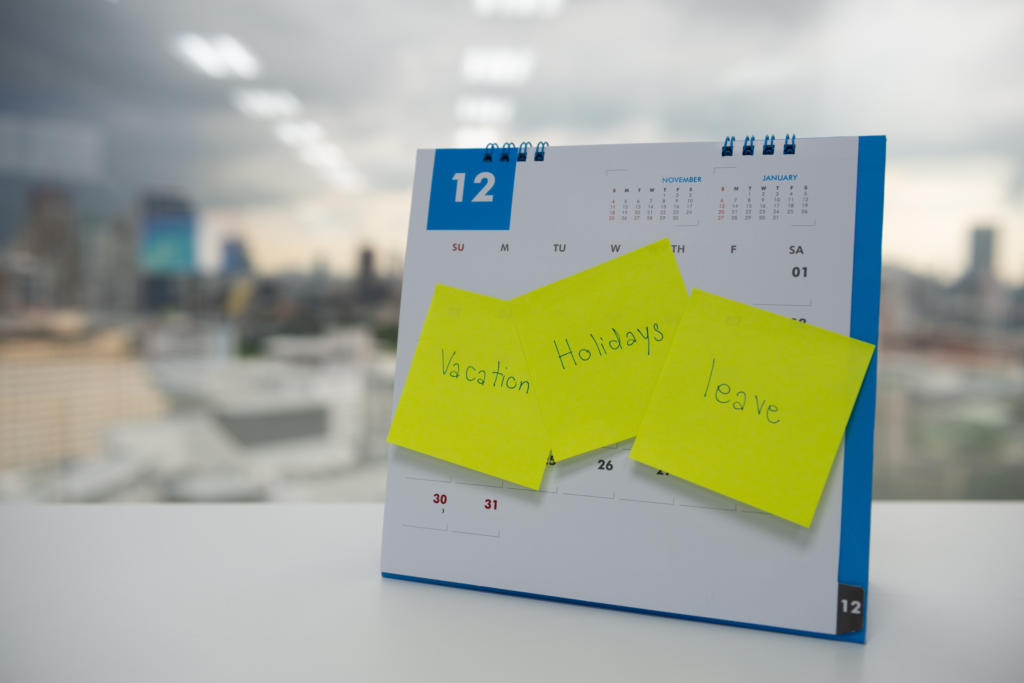
The advice given in this article is correct as of 20th April 2020. The situation with Coronavirus is developing rapidly, so please do check our COVID-19 Insights Hub for the latest updates.
Most employers have been finding it hard to plan with the lack of information about how to treat annual leave for those on furlough. Finally late on Friday 17 April information on the Gov webpage was updated. So what is the position?
Do employees continue to accrue holiday whilst on furlough?
Yes – they do accrued leave as per their employment contract. If the employee gets more than the statutory holiday (5.6 weeks), then you can ask them to agree to reduce that holiday down to the statutory amount only for the period furlough. You cannot impose this though – it has to be with their consent and should be within the furlough agreement letter.
Note however that the guidance does say: During this unprecedented time, we are keeping the policy on holiday pay during furlough under review. So do keep an eye on updates on this.
Can employees have holiday paid whilst on a period of furlough i.e. if a furloughed employee takes annual leave, should they be paid at 80% or 100%?
Yes – employees can take holiday whilst on furlough. They should be paid as normal.
The Working Time Regulations (WTR) require holiday pay to be paid at the employee’s normal rate of pay or, where their rate of pay varies, calculated on the basis of the average pay they received in the previous 52 working weeks. Note that this method of calculation changed on 6 April 2020. Before then you could calculate this based on the preceding 12 weeks.
Remember also that holiday pay should be based on ‘normal remuneration’ in accordance with the WTR, which can include overtime, commission and standby payments. This can be a complex area so take advice if you are unsure.
Will the Government reimburse the holiday pay employers pay their furloughed employees?
Yes, the guidance confirms you can make a grant for an annual leave furlough day in the usual way. As this would be capped at 80%/£2500 per month you are in effect ‘topping up’ for those annual leave days by paying the difference between that and their normal pay to your employees.
Will the minimum 3 week furlough period be affected by a furloughed employee taking holiday?
We do not have clarification on this point, but we think not. There is nothing on the government websites or HMRC portal (now opened) that suggests that this is so.
Can you make employees take annual leave whilst on furlough?
Yes, you can force employees to do this provided you give twice as much notice as the time that is being taken off, e.g. if you want employees to take 2 days, then you must give them 4 days’ notice.
Rather than telling your employees to do this, it may be beneficial for employee relations to simply ask them to agree to take their annual leave now, especially as they may get paid more for their holiday than the reduced furlough earnings, and welcome this.
You could also set a rule that you would like staff to take their accrued annual leave when furloughed within that period, provided this still meets the ‘double notice’ rule above. You could also put this same rule into place for non furloughed workers where you don’t want them to accrue too much leave to be taken later. For example a memo to all staff asking them to ensure during this time that they take 1/12th of their annual holiday leave entitlement each month during this time.
Can you restrict the annual leave of your employees once the lockdown lifts and we get back to work as normal?
Yes, you can refuse to allow annual leave provided there is a business reason for doing so. This may well be helpful in the recovery period when you need people at work.
You can also give notice to an employee to cancel any annual leave they have booked. If you decide to do this, you must give the employee at least the same number of days’ notice as the original holiday request (so 5 days leave needs 5 days notice to cancel).
It’s best to explain clearly why you need to do this and seek to resolve staff worries about how it will impact on entitlement or plans. Perhaps explain when they can take it and give more notice if possible.
What about pre-booked holidays that an employee wants to cancel?
If an employee no longer wants to take time off which was been previously booked, then the employer can still tell its employee to take the time off. To change the holiday the employee needs to get the employer’s agreement.
What about bank holidays falling in the furlough period?
If an employee usually works bank holidays then you can agree that this is included in the grant payment and not pay any extra to the employee.
If the employee usually takes the bank holiday as leave, then the employer would either have to top up the employee’s pay to their usual holiday pay, or give them a day of holiday in lieu.
If you agree with the employee that they can take the bank holiday as part of their annual leave entitlement, you should pay them usual holiday pay as above.
Can holiday be rolled over into the next leave year?
If you have a provision in your contract that allows this, this remains in place.
On 27th March 2020 the Government announced that workers who have not taken all of their statutory annual leave entitlement (up to 4 weeks) due to coronavirus will now be able to carry it over into the next 2 leave years. This is where it is not reasonably practicable for them to take some, or all, of the holiday they are entitled to due to coronavirus.
Please see the full guidance here as there are a few exceptions to be aware of e.g. sea-farers or trainee directors but it does apply to 99% of businesses.
Why has the law changed on a temporary basis?
The change is aimed at allowing businesses under particular pressure from the impacts of coronavirus the flexibility to better manage their workforce, while protecting workers’ rights to paid holiday.
Note however that ACAS is still encouraging workers and employees to take their paid holiday where possible. This is so that people get the right rest they need.
Do the changes apply to all employees?
Yes, the changes will apply to almost all types of workers, including agency workers, those who work irregular hours, and workers on 0 hours contracts.
ACAS has said that the Government announcement may be applied in the following situations:
- Workers who are self-isolating or are too sick to take holiday before the end of their leave year; and
- Workers who have had to continue working and could not take paid holiday.
ACAS also recognises that employees that have been furloughed may also fall into this category IF they cannot reasonably use the holiday in their holiday year. This is unlikely to apply to your furloughed employees if you are giving them all opportunity to take their leave in the current holiday year.
We consider that this is really aimed at staff who are working in businesses where they need the flexibility to allow workers to carry over leave at a time when granting annual leave could leave them short-staffed such as food production, distribution and healthcare.
How do the changes work?
Under the current regulations employees are entitled to a minimum of 5.6 weeks of leave (28 days including bank holidays) in a leave year. This is pro-rated for part time staff. Annual leave is granted by regulations 13 and 13A of the Working Time Regulations 1998. The 5.6 weeks is broken down under the regulations to:
- 4 weeks – Can now be carried over for up to 2 years if it has not been reasonably practicable for a worker to take some, or all, of the holiday due to coronavirus. This extends the current exceptions established through case law to only allow this due to sickness or family-friendly leave.
- 1.6 weeks – Can still be carried over by agreement for 1 year but no further.
This holiday cannot be replaced with a payment in lieu unless the worker is leaving employment.
Some employers offer more than the statutory minimum. Any changes to this must be agreed in writing.
It also does not matter what leave year you use. Whether that is January – December or April – May.
What happens to accrued holiday if you make an employee redundant?
If you make an employee redundant now or in the next 2 year period, you should pay them in lieu for any accrued but untaken paid holiday. This calculation must include any statutory holiday they were unable to take due to sickness, maternity or because of coronavirus. This would usually be paid as a lump sum in their final pay.
